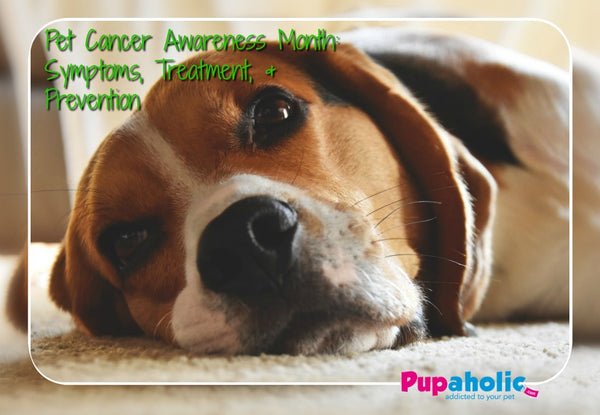Blog

May Is...Pet Cancer Awareness Month
With May being Pet Cancer Awareness Month, many pet owners are taking the chance to educate themselves about the many health risks our animals face on a daily basis. Cancer is the leading causing of death for dogs over the age of ten, but these numbers can be reduced when you know what to look for. It's estimated by experts that almost 50% of dogs over the age of ten will develop cancer at some point, be it malignant or benign. Much the same as humans, dogs can experience cancer anywhere in their body. The difference? Dogs aren't able to take themselves to the vet the same way we can take ourselves to the doctors.
Hoping to learn more about dog cancer this May? We've compiled all the information you'll need in order to keep your pooch safe and to give you some peace of mind!
Signs and Symptoms
While the best way to keep an eye on your dog's health is regular check-ups with your local vet, it’s also important that you monitor your dog's health from home. While any one of these individual symptoms -- if seen once or twice -- may be harmless, it's better to be safe than sorry. Keep an eye out for the following:
Abnormal Bleeding: Particularly, you'll want to keep an eye on any bleeding from an orifice on your dog. While bleeding from the nose will not necessarily signal cancer, it is a common symptom of nose cancer.
Lumps and Bumps: One of the most obvious signs of cancer in dogs is a mass beneath the skin, particularly one that keeps growing. Keep an eye on any abnormalities in your dog's body, as these masses will often need to be biopsied to know exactly what they are.
Weight Loss: While it's normal for a dog's weight to fluctuate, it may be a sign of cancer if your dog's weight is dropping unexpectedly or rapidly.
Loss of Appetite: Similar to rapid weight loss, it's important to watch and make sure your dog is eating properly. Loss of appetite may be a sign of a tumor in or along the intestine.
Sores: You'll want to keep a watchful eye on any sores your dog may have. If you find your dog is getting sores that won't heal, despite antibiotics, you may need to consult a vet.
Remember that each one of these symptoms will not necessarily be cancer, it's important to watch for any abnormal activity in your dog. For example, it may not be a bad sign if your dog loses his appetite for a single evening, but the prolonged loss of appetite may signal a much larger problem.
Treatment Options
For the unfortunate majority of dogs who will develop cancer, there are some fantastic treatment options available. A cancer diagnosis from your vet doesn't mean the worst case scenario, and it's important to keep in mind that there are always options for you. Vets agree that the majority of tumors -- including those on the skin, soft tissue, and breast -- can simply be removed with surgery, bringing your dog back to normal. For those who surgery is not a good option for, dogs have most of the same treatment options humans have. Chemotherapy is becoming more common every day, and radiation therapy is even starting to gain some traction in the veterinary world.
Prevention
For those concerned about how to keep your dog healthy for years to come, there are some simple and effective ways that you can help prevent cancer. For one, it's been shown that proper oral care of your dog can reduce the chances of oral cancer developing. It's also important to make sure your dog is taking in a proper and balanced diet, eliminating sugar and simple carbohydrates as much as you can. In addition, there have also been studies that support that getting your dog spayed before her first heat will lower chances of mammary-gland cancer.
Canine cancer is not the end of the world, and it's important to remember you're not alone on this journey. With more treatment options being developed every day, we're seeing dogs live longer and longer. In the meantime, it's best to keep an eye on your dog daily, making sure to take care of their health on a daily basis and keep track of any abnormalities. Be sure to spread the word this May, letting other dog owners know what to look out for to keep their dog healthy and happy!
For a list of all dog-related holidays click here to view Pupaholic's calendar.
